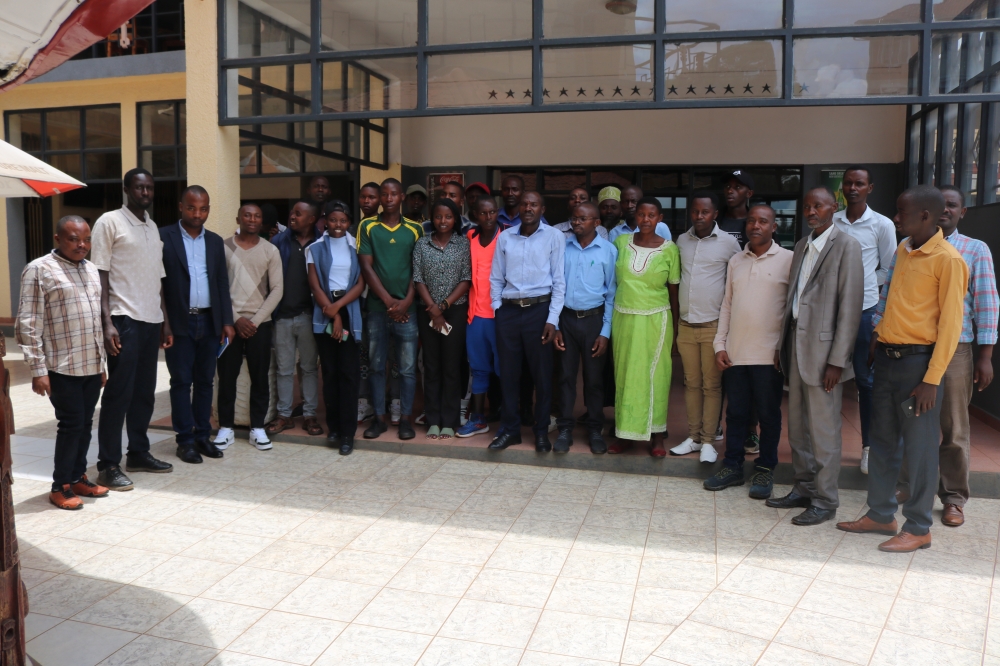

The University of Rwanda’s African Center of Excellence in Internet of Things (ACEIoT), has , on 30 March, conducted an awareness session to beekeepers associated with cooperatives in Huye District for the newly invented Smart Bee Hive Technology (SBHT). This technology was developed to enhance beekeeping activities and ultimately boost honey production.
SBHT is a technology which tracks temperature, humidity, sound, movement inside and outside the hives. By utilizing sensors, beekeepers can remotely control these parameters through their smartphones.
The technology which got funding from the International Centre of Insect Physiology and Ecology (ICIPE), is being implemented in partnership with NARADA Electronics Limited, a Rwandan private company dedicated to embedded systems development, training, and consultancy.
Elias Ntawuzumunsi, a doctorate student at the African Centre of Excellence in Internet of Things(ACEIoT), who invented the device said this was the opportunity to even get ideas on how to improve this technology before commercialisation.
Ntawuzumunsi explained, "the device is equipped with a digital siren to deter animals and intruders, smoke detectors to notify beekeepers of forest fires, and an air ventilation system to protect bees exposed to harmful external air”. Ntawuzumunsi was inspired by the significance of honey for health and the observed untapped potential in Rwanda's beekeeping industry.
After getting to know the functionality of the device, beekeepers expressed interest in the use of the device once on their disposal. Munyaneza Wellars, one of beekeepers from KOPABUHU cooperative, finds this device addresses key issues such as lack of adequate information about hive conditions, theft of honey produce, and colony health monitoring.
He said, "during rainy season, most of bees die due to humidity. With this technology, we will be able to monitor this ahead of time and take actions to avoid the loss”.
He added, "If possible for smart phones owners, you can include the feature where instead of getting only alarm, we even get image of the object passing by the beehive so that we know how to deal with it”.
One device costs Rwf 150,000. Assoc. Prof. Damien Hanyurwimfura, the Principal investigator of the project and the Director of ACEIoT said they are aware that this might not be affordable to every one but promised to advocate for incentives so that all beekeepers can afford it.
"We will continue to mobilize more funds for the improvement of the device, multiplication and affordability”, he noted.
"NARADA LTD in collaboration with the involved researchers at ACEIoT will continue to update the product adding more features as suggested by beekeepers before comercialization”, he added.
After the awareness workshop, the project team conducted a site visit to Nyaruguru District, Ngoma Sector where the SBHT has been recently installed, being tested. The feedback from beekeepers is positive.
"The device is working very well, we are notified through a phone alarm whenever an intruder enters the farm which assures that the security of our hives is granted” said Mr. Rutiyomba Ismael, the president of KOAKA cooperative where the device has been installed.
"We are also able to see the beehives conditions such as temperature, humidity and how much honey in the hive through our smart phones and this will help us know when the honey is enough to harvest”, he added.
With funding from the the partnership for skills in applying sciences, engineering and technology (PASET) with the Africa regional scholarship and innovation fund (RSIF) under under International Centre of Insect Physiology and Ecology (ICIPE), the African Center of Excellence in Internet of Things (ACEIoT) at the University of Rwanda has been working on the "Smart Bee Hive Technology" project for the past two years.
Through the partnership with Africa Regional Scholarship and Innovation Fund (RSIF) for applied sciences, engineering, and technology, knowledge of the device has already been disseminated to more than 50 beekeepers.


